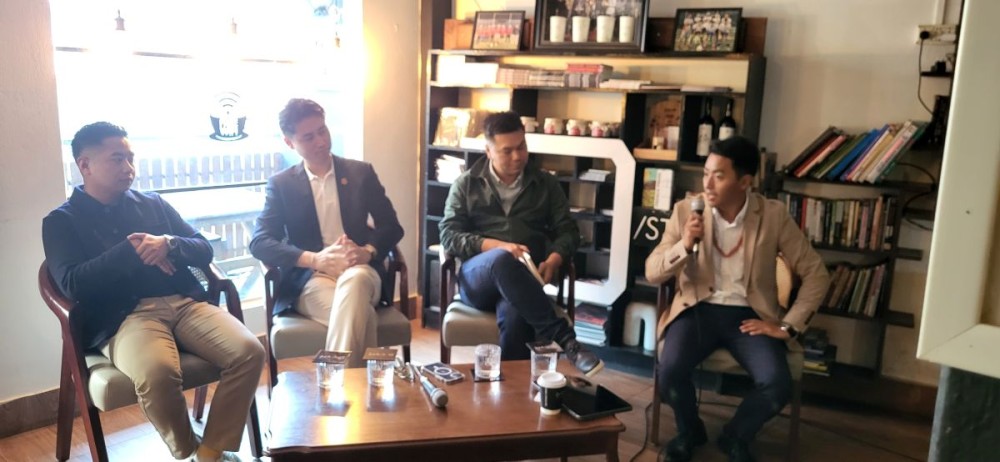Speakers (from left) Theja Tsukru, Boka K Rochill and Kevisato Sanyu along with Moderator Akho Phira during the Dialogue Series organized by Global Shapers Community, Kohima at D'Cafe, Kohima or May 9. (Morung Photo)

Morung Express news
Kohima | May 9
Global Shapers Community Kohima hosted a Dialogue Series, ‘The Future Is Now,’ on sustainable strategies for a lasting impact focusing on building actionable insights for environmental resilience in Nagaland and to drive positive change in communities at D'Cafe, Kohima on May 9.
The first panelist, Kevisato Sanyu who is an Entrepreneur, Educator, Indigenous Innovator and Founder of NagaEd expressed how we need to go back and stay connected with nature to forge resilience and sustainability while describing nature as an outstanding opportunity of contemplation, reflection, renewal and ways of healing.
Logically speaking, he told the attendance to imagine how going to the forest will give a person a good breathing space, a fresh connection.
Sanyu said being in a city or in a concrete circle, it is impossible to understand nature and therefore it is important to go and get exposure with nature to understand its intrinsic value.
“When you give children the experience of nature before the age of 8 years be it in any space, later on in life, it is easier to explain the concept of sustainability and nature. Without experience, the person won't get it,” the panelist pointed out adding that experiences of tribal or the ways of living of the forefathers have values relevant to the core of sustainability.
“Therefore northeast as a whole is really seen as a buffer state or a natural resources and this is the value,” he said.
In turn, having experiences of nature will help people to understand the nuances of policies.
For instance, Sanyu spoke about how our forests are locked to secure its biodiversity where the bio resources in the forest are not for the people but for the forest itself.
He also took the example of an Island in New Zealand where a river was given the rights of a person, knowing and observing the importance of the river to the locals there.
“These are practices and world views we need to articulate to the wider world about how we derive value,” the speaker said adding that as tribal and indigenous people we have the value to shape policies that reflect our world views and to find the intrinsic value because for most of us here even if we live in town we have forest above us that many other people in cities may not have.
Boka K Rochill who is a Policy Analyst, Urbanist and Systems innovator spoke on how can we drive development to be contingent with sustainability on whether we go for linear or circular development.
He encouraged young leaders to become contributors of change through individual consciousness.
As for himself, Rochill shared how he advocates for public transport observing that private car owners in Nagaland or Kohima is very high and contributing to traffic congestion, pollution and other negative impacts.
The speaker expounded the importance of reflecting on how urbanization is emerging and how must view sustainability in that context by taking into account our topography and the local challenges it have.
To speak about Kohima, he took the instance of how the traffic menace need to have a closer.
While speaking of the area of waste management, Rochill said a key challenge was waste collection or just picking up trash keeping in mind the number of cars parked on the sides
Towards this, Rochill cited that such issues, big or small, otherwise are inter-connected, and therefore requires ground evidence led holistic approach when we tackle our issues and give policies recommendations
“There need to be right intent or right push from different groups,” Rochill sakd.
He further called for environmental stewardship and also added that the onus of waste management should not just be on the end users but for primary producers or suppliers.
Theja Tsukru, an Architect and Urban Infrastructure Lead AEC Entrepreneur spoke from his experiences as an architect with Smart City, Kohima and took the attendance on how incorporating sustainable practices on not just infrastructures but how it can help by putting in best practices.
Looking around the infrastructures that have come up and are being constructed under Smart City Mission Kohima, Tsukru said one thing that it had put effort in was incorporating maximum designs and ideas that are best suited and relevant to the local City keeping in mind that sustainability should not strictly be one way.
Children parks, he remarked is now one of the new initiative coming up adding that these positive spaces are coming up by creating and transforming spaces which were dumping cites or unused spaces.
In the long run, he said this is not just important for our local region but for the global community.
The discussion was moderated by Akho Phira, Team Leader, FNGO (NAAME) and Co-founder, Community Library Kigwema.






